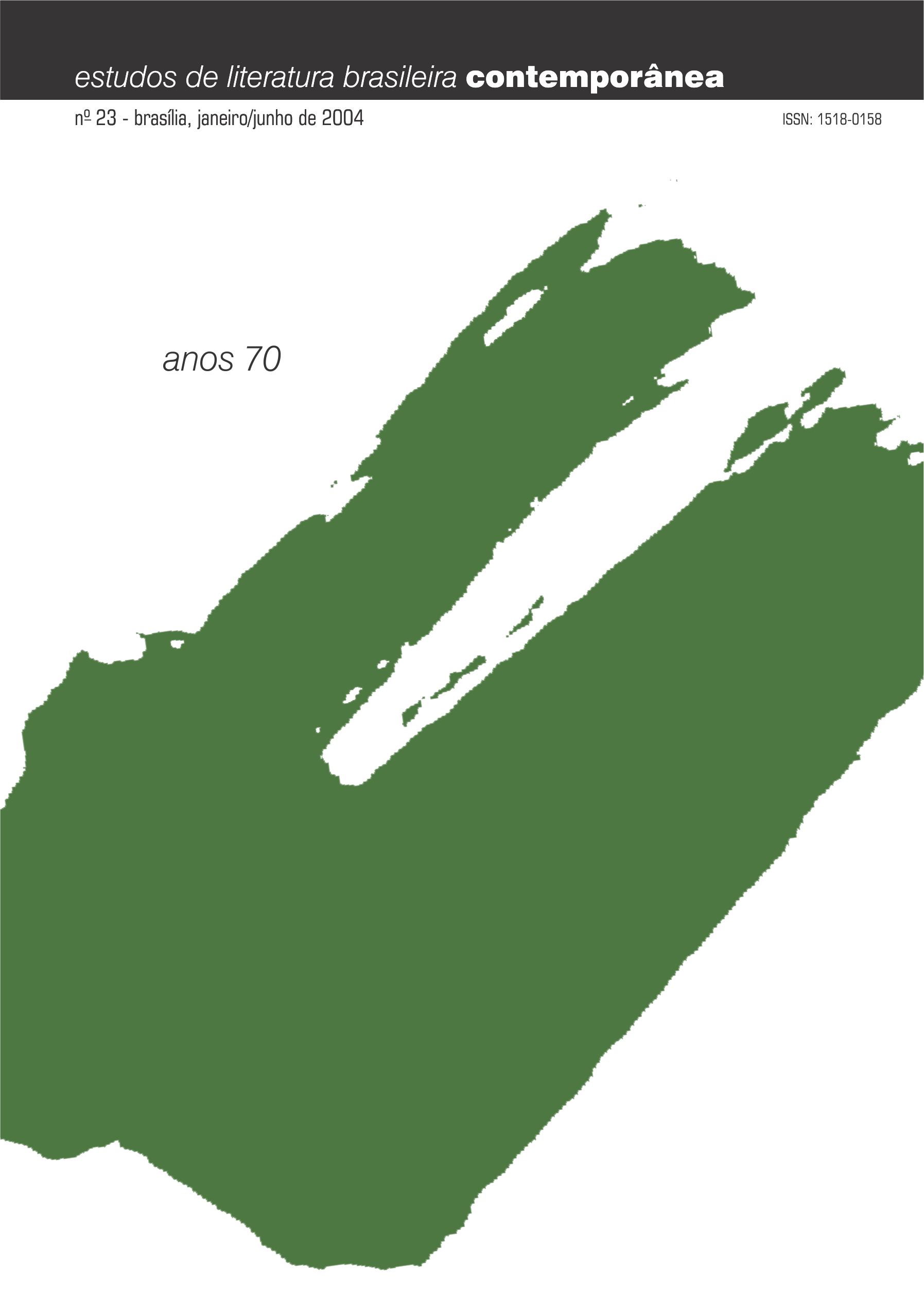Afinal, o que foram as Artimanhas da década de 70?:
a Nuvem Cigana em nossa história cultural
Abstract
Este texto discute de forma aprofundada as Artimanhas: performances poéticas realizadas na década de 70 pelo grupo Nuvem Cigana, principal foco de produção de poesia marginal no Rio de Janeiro. A análise é feita em três etapas: na primeira, define-se a noção de performance de poesia no contexto dos anos 60 e 70, recorrendo-se para tanto a uma história que transcende as fronteiras nacionais. Em seguida, a partir de um exame formal da Artimanha, propõese sua leitura como performance hiperbólica. Finalmente, avalia-se a funcionalidade das Artimanhas na atuação da Nuvem Cigana, redimensionando o papel do grupo em nossa história cultural recente.
References
BURGER, Peter. Theory of the avant-garde. Minneapolis: University of Minnesota Press, 1984.
CACASO. Não quero prosa. Organização e seleção de Vilma Arêas. Campinas: Editora da Unicamp; Rio de Janeiro: Editora da UFRJ, 1997.
CAMPBELL, James. This is the beat generation. New York, San Francisco, Paris: Vintage, 2000.
CAMPOS, Augusto de. O balanço da bossa e outras bossas. 5a. ed. São Paulo: Perspectiva, 1994.
CHACAL. Nariz aniz. Rio de Janeiro: Nuvem Cigana, 1979.
______. “Artimanha: ardil, artifício, astúcia”. Malasartes, nº 3. Rio de Janeiro, 1976, p. 32.
______. Muito prazer. Rio de Janeiro: 7 Letras, 1997.
FOUCAULT, Michel. “Préface à la transgression”, em Dits et écrits, t. I. Paris, Gallimard, 1994.
LEE, Robert A. (ed.). The beat generation writers. London: Pluto Press, 1996.
MCLUHAN, Marshall. The Gutenberg galaxy: the making of typographic man. London: Routledge, 1962.
MEDEIROS, Fernanda T. de. Poesia em performance nos 70: o British Poetry Revival e a Nuvem Cigana. Tese de doutorado em Literatura Comparada. Orientadora: Cláudia Neiva de Matos. Niterói: UFF, 2002, mimeo.
______. “Artimanhas e poesia: o alegre saber da Nuvem Cigana”. Gragoatá, nº 12. Niterói, 2002, p. 113-28.
MOREIRA, Sonia Virgínia. “As alternativas da cultura (anos 60/70)”, em MELLO, Maria Amelia (org.). 20 Anos de resistência: alternativas da cultura ao regime militar. Rio de Janeiro: Espaço e Tempo, 1986.
MOTTRAM, Eric. “‘Declaring a behaviour’: the poetry performance”. RAWZ, nº 1. London, 1977.
PEREIRA, Carlos Alberto Messeder. Retrato de época: poesia marginal, anos 70. Rio de Janeiro: MEC/Funarte, 1981.
SANTIAGO, Silviano. “Poder e alegria: a literatura brasileira pós-64 ”“ reflexões”, em Nas malhas da letra. São Paulo: Compnhia das Letras, 1989.
______. “Caetano Veloso enquanto superastro”, em Uma literatura nos trópicos. São Paulo: Perspectiva, 1978.
SANTOS, Ronaldo. 14 bis. Rio de Janeiro: Nuvem Cigana, 1979.
SCHOFFIELD, John. “Poem 73 and all that jazz”. Akros, vol. 8 nº 22, 1973, p. 28-32.
SONTAG, Susan. “Happenings: an art of radical juxtaposition”, em Against interpretation and other essays. London: Eyre & Spottiswoode, 1967.
ZUMTHOR, Paul. Introdução à poesia oral. São Paulo: Hucitec, 1997.
______ . A letra e a voz. São Paulo: Companhia. das Letras, 1993.
______. Performance, réception, lecture. Longueuil: Les Éditions du Préambule, 1990.
Downloads
Published
Issue
Section
License
Authors who publish in this journal agree to the following terms:
a) The authors maintain the copyright and grant the journal the right of first publication, the work being simultaneously licensed under the Creative Commons Attribution License-Non Commercial 4.0 which allows the sharing of the work with acknowledgment of the authorship of the work and publication this journal.
b) Authors are authorized to enter into additional contracts separately, for non-exclusive distribution of the version of the work published in this journal (eg publish in institutional repository or as a book chapter), with authorship recognition and publication in this journal.
c) Authors are allowed and encouraged to publish and distribute their work online (eg in institutional repositories or on their personal page) after the editorial process, as this can generate productive changes, as well as increase the impact and citation of published work (See The Effect of Free Access).
d) The authors of the approved works authorize the magazine to, after publication, transfer its content for reproduction in content crawlers, virtual libraries and the like.
e) The authors assume that the texts submitted to the publication are of their original creation, being fully responsible for their content in the event of possible opposition by third parties.


